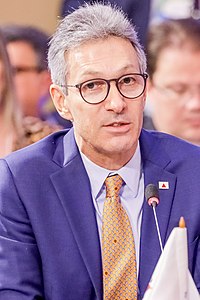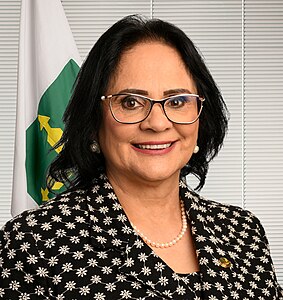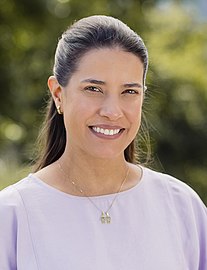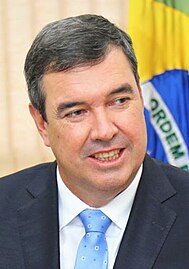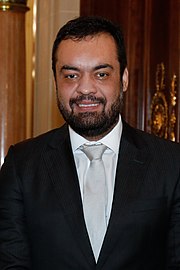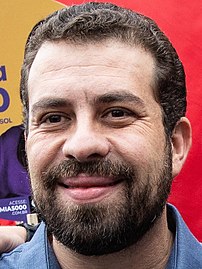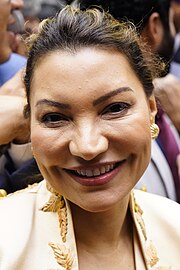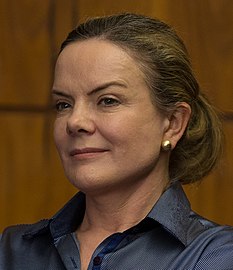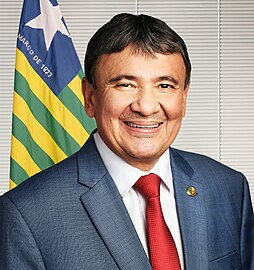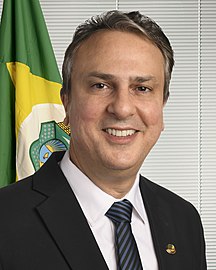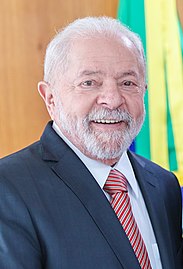2026 Brazilian general election
| ||||||||||||||||||||||||||||||||||||||||||||||||||||
|
| ||||||||||||||||||||||||||||||||||||||||||||||||||||
Presidential election | ||||||||||||||||||||||||||||||||||||||||||||||||||||
| Opinion polls | ||||||||||||||||||||||||||||||||||||||||||||||||||||
|
| ||||||||||||||||||||||||||||||||||||||||||||||||||||
| ||||||||||||||||||||||||||||||||||||||||||||||||||||
All 513 seats in the Chamber of Deputies 257 seats needed for a majority | ||||||||||||||||||||||||||||||||||||||||||||||||||||
| ||||||||||||||||||||||||||||||||||||||||||||||||||||
54 of the 81 seats in the Federal Senate 41 seats needed for a majority | ||||||||||||||||||||||||||||||||||||||||||||||||||||
| ||||||||||||||||||||||||||||||||||||||||||||||||||||
General elections will be held in Brazil on 4 October 2026 to elect the president, vice president, members of the National Congress, the governors, vice governors, and legislative assemblies of all federative units, and the district council of Fernando de Noronha. If no candidate for president—or for governor in some states—received more than half of the valid votes in the first round, a runoff election for these offices will be held on 31 October.
Incumbent left-wing president Luiz Inácio Lula da Silva of the Workers' Party is eligible for a fourth term. However, he has stated that he will not seek re-election.[1]
Having unsuccessfully run for president in 1989, 1994, and 1998, Lula was elected in 2002 and re-elected in 2006. He was then succeeded by his chief of staff, Dilma Rousseff, who was elected in 2010 and re-elected in 2014. Lula attempted to run for the presidency for a third non-consecutive term in 2018, but his candidacy was denied by the Superior Electoral Court due to his previous conviction on corruption charges in 2017. A series of court rulings led to his release from prison in 2019, followed by the annulment of his conviction and restoration of his political rights by 2021. For his vice presidential candidate in the 2022 election, Lula selected Geraldo Alckmin, who had been a presidential candidate of the Brazilian Social Democracy Party in 2006 (facing Lula in the second round) and 2018 but changed his affiliation to the Brazilian Socialist Party in 2022.
Lula won the 2022 election by the closest margin in Brazilian history, defeating incumbent right-wing president Jair Bolsonaro by 1.9% (or 2,139,645 votes). Lula, re-elected in 2022, became the first person to secure a third presidential term, receiving the highest number of votes in a Brazilian election. At the same time, Bolsonaro, elected in 2018, became the first incumbent president to lose a bid for a second term since a 1997 constitutional amendment allowing consecutive re-election. In response to his loss, some Bolsonaro supporters demanded a military coup to prevent Lula's inauguration, but failed to gather sufficient support. Before Lula's inauguration, Bolsonaro left the country for the United States and was later, controversially, barred from running for a second term before 2030.[2]
Background[edit]
From 1994 to 2014, presidential elections in Brazil were dominated by candidates of the centrist Brazilian Social Democracy Party and the left-wing Workers' Party. After unsuccessful attempts in the 1989, 1994, and 1998 presidential elections, Workers' Party candidate Luiz Inácio Lula da Silva was elected in the 2002 and 2006 presidential elections.[3] His successor from the same party, Dilma Rousseff, was elected in the 2010 and 2014 presidential elections. The controversial 2016 impeachment of Rousseff removed her from office due to administrative misconduct, and she was succeeded by her vice president, Michel Temer of the centrist Brazilian Democratic Movement. In 2017, Operation Car Wash controversially resulted in Lula being convicted on charges of corruption by judge Sergio Moro and arrested, which prevented his intended candidacy in the 2018 Brazilian presidential election, despite his substantial lead in the polls. He was replaced as his party's presidential candidate by former mayor of São Paulo, Fernando Haddad, who lost to right-wing candidate Jair Bolsonaro of the Social Liberal Party.[4][5][6]
In 2019, Bolsonaro left the Social Liberal Party. This was followed by the dismissal or resignation of many members of the Bolsonaro administration,[7] including Moro, whom he had appointed as Minister of Justice and Public Safety. Bolsonaro then attempted to create another party, the Alliance for Brazil, but he was unsuccessful.[8] In 2021, Bolsonaro joined the Liberal Party and selected Walter Braga Netto of his party as the vice presidential candidate instead of Hamilton Mourão, the incumbent vice president.[9] A series of rulings by the Supreme Federal Court questioning the legality of Lula's trial and the impartiality of then judge Moro led to Lula's release from prison in 2019, followed by the annulment of Moro's cases against Lula and the restoration of Lula's political rights by 2021.[10][11] Lula launched his candidacy for president in 2022, selecting as his vice presidential candidate Geraldo Alckmin, who had been a presidential candidate of the Brazilian Social Democracy Party in 2006 and 2018 but changed his affiliation to the left-wing Brazilian Socialist Party in 2022.[12][13] The three parties supporting Bolsonaro in 2022 (Liberal Party, Progressistas, and Republicans) had supported Alckmin in 2018 and Rousseff in 2014.[14] After Bolsonaro's departure from the Social Liberal Party, the party merged with the Democrats to form the Brazil Union in 2022.[15]
Electoral system[edit]
Brazil's president and vice president are elected as a joint ticket using the two-round system. The first round of elections is held on the first Sunday of October, which in 2022 was on 2 October.[16] A candidate who receives more than 50% of the total valid votes in the first round is elected. If the 50% threshold is not met by any candidate, the two candidates who receive the most votes in the first round participate in a second round of voting, held on the last Sunday of October (in this instance, 30 October 2022), and the candidate who receives a plurality of votes in the second round is elected. The 2022 Brazilian gubernatorial elections to elect the governors and vice governors of all states of Brazil and of the Federal District were held on the same dates and with the same two-round system as the presidential election. One-third of the 81 members of the Brazilian Senate were up for election in 2022, one senator being elected from each of the states and the Federal District using plurality voting. The other two-thirds of the Senate were elected in 2018.[17]
All 513 members of the Chamber of Deputies (federal deputies) are elected from 27 multi-member constituencies corresponding to the states and the Federal District, varying in size from 8 to 70 seats. All members of the Legislative Assemblies of Brazilian states (state deputies) and of the Legislative Chamber of the Federal District (district deputies), varying in size from 24 to 94 seats, are also elected. These elections are held using open list, proportional representation, with seats allocated using integer quotients and the D'Hondt method.[18][19] All seven members of the District Council of Fernando de Noronha are elected by single non-transferable vote. Unlike elections for other offices in Brazil, candidates for this council are not nominated by political parties.[20]
Voters[edit]

Voting in Brazil is allowed for all citizens over 16 years old. There is compulsory voting for literate citizens between 18 and 70 years old except conscripts; as there is conscription in Brazil, those who serve the mandatory military service are not allowed to vote.[21] Those who are required but do not vote in an election and do not present an acceptable justification, such as being absent from their voting locality at the time,[22] must pay a fine, normally R$3.51,[23][24] which is equivalent to US$0.67 as of October 2022. In some cases, the fine may be waived, reduced, or increased up to R$35.13 (US$6.67).[25]
The Brazilian diaspora may only vote for president and vice president.[26] Due to the Equality Statute between Brazil and Portugal, Portuguese citizens legally residing in Brazil for more than three years may also register to vote in Brazilian elections.[27]
Candidates and political parties[edit]
All candidates for federal, state, Federal District, and municipal offices must be nominated by a political party. For offices to be elected by majority or plurality (executive offices and senators), parties may form an electoral coalition (coligação) to nominate a single candidate. The coalitions do not need to be composed of the same parties for every nomination, do not need to be maintained after the election, and are not valid for offices to be elected proportionally (deputies and aldermen).[28] A new law, valid for this election, also allowed parties to form a different type of alliance called federation (federação), which acts as a single party to nominate candidates for all offices in all locations, including those to be elected proportionally, and must be maintained with a single leadership structure over the course of the elected legislature.[29] Federations may also act as parties to form coalitions. For 2022, the federations formed were Brazil of Hope (PT–PCdoB–PV), Always Forward (PSDB–Cidadania), and the PSOL REDE Federation (PSOL–REDE).[30]
For offices to be elected proportionally, each party must nominate candidates of each sex in a distribution between 30 and 70%.[28] Under rulings by the Superior Electoral Court and the Supreme Federal Court, parties must also allocate their funds and broadcast time proportionally to the number of their candidates of each sex and race.[31]
Procedure[edit]

Voting in Brazilian elections can only be done in person and only on election day, which is always a Sunday. There is no provision for either postal voting or early voting. Voter registration must be done in advance, and each voter can only vote in one designated voting station, either based on the voter's registered domicile or at a different location that the voter must specifically request if planning to be there temporarily on election day. Voters must provide photo identification at their voting station before proceeding to vote.[32]
More than 92,000 voting stations were installed in all municipalities of Brazil, the Federal District, and Fernando de Noronha.[33] Most voting stations are in public schools.[34] In some sparsely populated areas, such as indigenous territories, the installation and use of voting stations requires extensive travel and logistics.[35] Voting stations were also installed in 160 locations in other countries, mostly in Brazilian diplomatic missions, for citizens residing abroad.[36]
Voting is done almost entirely on DRE voting machines, designed for extreme simplicity. The voter dials a number corresponding to the desired candidate or party, causing the name and photo of the candidate or party to appear on the screen, then the voter presses a green button to confirm or an orange button to correct and try again. It is also possible to leave the vote blank by pressing a white button, or to nullify the vote by dialing a number that does not correspond to any candidate or party. Paper ballots are only used in case a voting machine malfunctions or in locations abroad with fewer than 100 voters.[32]

The electronic system is subject to extensive tests, including on machines randomly selected from actual voting stations on election day, witnessed by political parties to rule out fraud. After voting ends, every machine prints a record of its total votes for each candidate or party, which is publicly displayed for comparison with the results published electronically.[37] The system delivers the complete election results usually a few hours after voting ends, which is extremely fast for such a large population as Brazil. At the same time, the system does not create a physical record of individual votes to allow a full election recount.[38]
The partial vote count for an office can only start being published after voting has ended in all locations in Brazil voting for that office, to avoid influencing those still voting. Due to time zones in Brazil, in previous years the vote count for president (the only one that combines votes from more than one state) could only start being published after voting ended in UTC−05:00, two hours after it had ended for the vast majority of the population in UTC−03:00. To avoid this undesirable wait, the Superior Electoral Court ordered for 2022 that voting stations were to operate at the same time in the whole country, regardless of their time zone: 9:00 to 18:00 UTC−02:00, 8:00 to 17:00 UTC−03:00, 7:00 to 16:00 UTC−04:00, and 6:00 to 15:00 UTC−05:00.[39] Politicians from the state of Acre (UTC−05:00) filed a legal complaint against this order due to the unreasonably early start of voting preparations in their local time; the complaint was dismissed by the Supreme Federal Court.[40] The unified voting time does not apply to voting stations for citizens abroad, which still operate from 8:00 to 17:00 local time, even though some of them end up to four hours after UTC−03:00.[41][42] The same is expected to remain for 2026.
Presidential candidates[edit]
Declared candidates[edit]
Brazil Union[edit]
- Ronaldo Caiado, orthopedic physician, former candidate for President of Brazil in 1989, former Federal Deputy for Goiás (1991–1995,1999–2015), former Senator for Goiás (2015–2019), and current Governor of Goiás (2019–present)[43][44]
Independent[edit]
- Danilo Gentili, comedian, writer, and political commentator[45][46]
Publicly expressed interest[edit]
As of January 2023, the following notable individuals have expressed an interest in running for president within the previous six months.
NOVO[edit]
- Romeu Zema, businessman, administrator, and Governor of Minas Gerais since 2019[47][48]
Republicanos[edit]
- Damares Alves, lawyer, evangelical pastor, former legal aide to the Federal Senate, former Minister of Families, Human Rights, and Citizenship (2019–2022), Senator for the Federal District since 2023[49]
Independent[edit]
- Luciano Huck, TV host and presenter[50]
Potential candidates[edit]
As of January 2023, there has been speculation about the potential candidacy of the following notable individuals within the previous six months.
Brazilian Democratic Movement[edit]
- Simone Tebet, professor, former Senator for Mato Grosso do Sul (2015–2023), candidate for president in 2022, and current Minister of Planning[47][51]
Brazilian Social Democracy Party[edit]
- Eduardo Leite, former Mayor of Pelotas, pre-candidate for President of Brazil in 2022, and Governor of Rio Grande do Sul (2019–2022, 2023–present)[52]
- Raquel Lyra, lawyer, former mayor of Caruaru (2017–2022), and Governor of Pernambuco (2023–present)[52]
- Eduardo Riedel, businessman, former director of the National Confederation of Agricultural Workers, and Governor of Mato Grosso do Sul (2023–present)
Brazilian Socialist Party[edit]
- Geraldo Alckmin, anesthesiologist, former Governor of São Paulo (2001–2006, 2011–2018), candidate for President of Brazil in 2006 and 2018, current Minister of Development, Industry and Foreign Trade and Vice President of Brazil[48]
- Márcio França, lawyer, former Federal Deputy for São Paulo (2007–2014), former Governor of São Paulo (2018), and current Minister of Ports and Airports[48]
- Flávio Dino, lawyer, former federal judge, former president of Embratur (2011–2014), former Governor of Maranhão (2015–2022), and current Minister of Justice and Public Security[51]
Liberal Party[edit]
- Cláudio Castro, lawyer, former member of the Municipal Chamber of Rio de Janeiro (2017–2019), and Governor of Rio de Janeiro (2021–present)[53]
Republicanos[edit]
- Hamilton Mourão, former general, former Vice-President of Brazil (2019–2022), and Senator for Rio Grande do Sul (2023–present)[54]
Sustainability Network[edit]
- Marina Silva, environmentalist, former Senator for Acre (1995–2003, 2008–2011), candidate for president in 2010, 2014, and 2018, Federal Deputy for São Paulo (2023–present), and Minister of the Environment (2003–2008, 2023–present)[47]
Social Democratic Party[edit]
- Gilberto Kassab, businessman, founder of the PSD, former Mayor of São Paulo (2006–2012), former Minister of Cities (2015–2016), former Minister of Science (2016–2018), and current State Secretary of Government of São Paulo (2023–present)[55]
- Ratinho Júnior, son of TV presenter Ratinho, businessman, former State and Federal Deputy from Paraná, former secretary of state of Paraná (2015–2017) and current Governor of State of Paraná (2019–present).[56][57]
Socialism and Liberty Party[edit]
- Guilherme Boulos, writer, activist, member of the National Coordination for the Homeless Workers Movement, candidate for President of Brazil in 2018, candidate for Mayor of São Paulo in 2020, and Federal Deputy from São Paulo (2023–present)[43]
Brazil Union[edit]
- Sergio Moro, former federal judge, leader of the Lavo Jato investigation, and Senator for Paraná (2023–present)[54]
Workers' Party[edit]
- Rosângela Lula da Silva, sociologist, First Lady of Brazil (2023–present)
- Gleisi Hoffmann, lawyer, former Senator for Paraná (2014–2019), Federal Deputy for Paraná (2019–present), and National President of the Workers' Party (2017–present)[58]
- Fernando Haddad, academic, former Minister of Education (2005–2012), former Mayor of São Paulo (2013–2016), candidate for president in 2018, and current Minister of Finance[48]
- Wellington Dias, bank clerk, writer, former Senator for Piauí (2011–2015), former Governor of Piauí (2003–2010, 2015–2022), and current Minister of Social Development (2023–present)[58]
- Camilo Santana, agricultural engineer, former Governor of Ceará (2015–2022), current Minister of Education (2023–present)[53]
Declined to be candidates[edit]
The following notable individuals have been the subject of speculation about their possible candidacy, but have publicly denied interest in running:
Workers' party[edit]
- Luiz Inácio Lula da Silva,[note 1] trade unionist, former metalworker, and President of Brazil (2003–2010, 2023–present)[1]
Liberal Party[edit]
- Michelle Bolsonaro, former First Lady of Brazil and wife of Jair Bolsonaro[54][60]
Republicans[edit]
- Tarcísio de Freitas, engineer, former Minister of Infrastructure (2019-2022), and Governor of São Paulo (2023–present)[61][62]
Ineligible[edit]
The following notable individuals have been the subject of speculation about their possible candidacy or have declared their interest, but have been declared ineligible by the Superior Electoral Court.
Liberal Party[edit]
- Jair Bolsonaro, President of Brazil (2019–2022), member of the Chamber of Deputies (1991–2018), councillor of Rio De Janeiro (1989–1991).[63][64]
Congress[edit]
| Party[65] | Chamber of Deputies | Senate | ||||||||
|---|---|---|---|---|---|---|---|---|---|---|
| Elected | Incumbent | +/– | Elected | Incumbent | +/– | Up for election[66] | ||||
| 2022 | 2023[67] | 2018 | 2022 | 2023[68] | 2026 | 2030 | ||||
| Liberal Party[a] | 99 | 97 | 1 | 8 | 12 | 4 | 8 | |||
| Workers' Party | 69 | 69 | 4 | 4 | 8 | 5 | 3 | |||
| Brazil Union | 59 | 59 | 8[b] | 5 | 9 | 4 | 5 | |||
| Progressistas | 47 | 50 | 5 | 3 | 6 | 3 | 3 | |||
| Brazilian Democratic Movement | 42 | 43 | 7 | 1 | 10 | 9 | 1 | |||
| Social Democratic Party | 42 | 43 | 4 | 2 | 16 | 13 | 3 | |||
| Republicans | 40 | 41 | 1 | 2 | 4 | 1 | 3 | |||
| Democratic Labour Party | 17 | 18 | 2 | – | 3 | 3 | – | |||
| Brazilian Socialist Party | 14 | 15 | 2 | 1 | 4 | 3 | 1 | |||
| Brazilian Social Democracy Party | 13 | 14 | 4 | – | 3 | 3 | – | |||
| Socialism and Liberty Party | 12 | 13 | – | – | – | – | – | |||
| Podemos | 12 | 15 | 3[c] | – | 4 | 4 | – | |||
| Avante | 7 | 7 | – | – | – | – | – | |||
| Communist Party of Brazil | 6 | 7 | – | – | – | – | – | |||
| Green Party | 6 | 6 | – | – | – | – | – | |||
| Solidarity | 7[d] | 4 | 2[e] | 1[f] | – | – | – | |||
| Democratic Renewal Party[g] | 4 | 5 | 1[h] | – | – | – | – | |||
| New Party | 3 | 3 | – | – | 1 | 1 | – | |||
| Sustainability Network | 2 | 1 | 5 | – | – | – | – | |||
| Independent politician | – | – | – | – | 1 | 1 | – | |||
| Total | 513 | 513 | 54 | 27 | 81 | 54 | 27 | |||
Opinion polls[edit]
2024[edit]
| Publisher/Pollster | Polling period |
Sample size |
Lula PT |
Freitas Republicanos |
M. Bolsonaro PL |
Gomes PDT |
Zema NOVO |
Ratinho PSD |
Others [i] |
Blank/Null/ Undec. |
Lead |
|---|---|---|---|---|---|---|---|---|---|---|---|
| Paraná Pesquisas[69] | 24–28 January | 2,026 | 37.6% | — | 23% | 9.3% | 6.5% | 5.1% | 2.8%[j] | 15.6% | 14.6% |
| 37.6% | 17.4% | — | 10.3% | 5.8% | 6.2% | 3.2%[k] | 19.6% | 20% | |||
| 36.9% | — | — | 7.8% | 3.9% | 3.9% | 35.8%[l] | 11.7% | 3.1% |
2023[edit]
| Publisher/Pollster | Polling period |
Sample size |
Lula PT |
Freitas Republicanos |
Tebet MDB |
Moro UNIÃO |
Gomes PDT |
Zema NOVO |
Ratinho PSD |
Leite PSDB |
Others [i] |
Blank/Null/ Undec. |
Lead |
|---|---|---|---|---|---|---|---|---|---|---|---|---|---|
| Paraná Pesquisas[70] | 29 September – 3 October | 2,020 | 36.6% | 12.7% | 7.4% | 6.7% | 6.3% | 5.7% | 4.6% | 2.1% | 3.1%[m] | 14.9% | 23.9% |
| 37.6% | 18.9% | 9.0% | — | 8.7% | — | — | 3.7% | — | 22.2% | 18.7% | |||
| 37.6% | — | 8.8% | — | 8.8% | 15.3% | — | 4.0% | — | 25.5% | 22.3% | |||
| 37.7% | — | 8.7% | — | 9.2% | — | 12.8% | 4.1% | — | 27.4% | 24.9% |
See also[edit]
Notes[edit]
- ^ The possibility of re-election mentioned by Rui Costa[59] had been ruled out by Lula during the 2022 electoral campaign.[1]
- ^ Named Party of the Republic before 2019.
- ^ 4 senators from Social Liberal Party and 4 senators from Democrats, whose parties merged to form Brazil Union in 2022.
- ^ Including 2 senators from the Humanist Party of Solidarity, which merged into Podemos after the 2018 election.
- ^ Including 3 deputies from the Republican Party of the Social Order, which merged into Solidarity in 2023.
- ^ Including 1 senator from the Republican Party of the Social Order, which merged into Solidarity in 2023.
- ^ Including 1 senator from the Republican Party of the Social Order, which merged into Solidarity in 2023.
- ^ Merger of the Brazilian Labour Party and Patriota.
- ^ From the Progressive Republican Party, which merged into Patriota after the 2018 election.
- ^ a b This column presents the sum of candidates who do not reach 3% frequently.
- ^ Ronaldo Caiado (UNIÃO) with 1.9% and Helder Barbalho (MDB) with 0.9%.
- ^ Ronaldo Caiado (UNIÃO) with 2.1% and Helder Barbalho (MDB) 1.1%.
- ^ Jair Bolsonaro (PL; ineligible) with 33.8%, Ronaldo Caiado (UNIÃO) with 1.2% and Helder Barbalho (MDB) with 0.8%.
- ^ Tereza Cristina (PP) with 1.9% and Ronaldo Caiado (UNIÃO) with 1.2%
References[edit]
- ^ a b c Malleret, Constance (25 October 2022). "Lula repeats that he will not seek re-election in event of victory". The Brazilian Report. Retrieved 18 October 2023.
- ^ "Eight-year election ban for Brazil's Jair Bolsonaro". BBC News. 30 June 2023.
- ^ Nugent, Ciara (2 November 2022). "How Lula Won the Most Crucial Election in Brazil for Decades". Time. New York City: Time Inc. ISSN 0040-781X. Archived from the original on 13 November 2022. Retrieved 14 November 2022.
- ^ Aarup, Sarah Anne (27 October 2022). "Bolsonaro vs. Lula? Brazil vote offers no easy answer for EU's LatAm-bitions". Politico. Retrieved 30 October 2022.
- ^ Downie, Andrew (30 October 2022). "Brazilians go to polls with Lula slight favourite to oust right-wing Bolsonaro". The Guardian. Retrieved 30 October 2022.
- ^ Nicas, Jack (29 October 2022). "Bolsonaro vs. Lula: Brazil Faces a Stark Choice With Huge Stakes". The New York Times. ISSN 0362-4331. Retrieved 30 October 2022.
- ^ "As principais baixas do governo Bolsonaro". Deutsche Welle (in Portuguese). Archived from the original on 9 July 2020. Retrieved 8 July 2020.
- ^ "Idealizado por Bolsonaro, partido Aliança pelo Brasil acaba por falta de assinaturas". CNN Brazil (in Portuguese). 30 April 2022. Retrieved 24 May 2022.
- ^ Spigariol, Andre (8 November 2021). "Bolsonaro to join right-wing Liberal Party for re-election campaign". The Brazilian Report. Retrieved 1 December 2021.
- ^ "Lula: Brazil's ex-president cleared by Supreme Court". Reuters. 8 March 2021. Archived from the original on 16 April 2021. Retrieved 16 April 2021.
- ^ Brito, Ricardo (15 April 2021). "Brazil's Supreme Court confirms decision to annul Lula convictions". Retrieved 5 November 2022.
- ^ Boadle, Anthony (23 March 2022). "Former Sao Paulo governor Alckmin joins leftist party to be Lula's running mate". Reuters. Retrieved 30 October 2022.
- ^ Paraguassu, Lisandra (14 December 2021). "Analysis: A possible alliance in the making between Lula, former rival in Brazil 2022 run". Reuters. Retrieved 15 December 2021.
- ^ "Após ameaças de divisão, Centrão fecha com Alckmin para tentar chegar ao segundo turno". G1.globo.com. 26 July 2018. Retrieved 1 November 2018.
- ^ "TSE aprova registro do partido União Brasil". Tribunal Superior Eleitoral (in Portuguese). Archived from the original on 9 February 2022. Retrieved 9 February 2022.
- ^ "Legal Research Guide: Brazil – The Executive Branch". Library of Congress. Archived from the original on 26 June 2019. Retrieved 2 July 2019.
- ^ "Federal Senate electoral system". Inter-Parliamentary Union. Archived from the original on 25 August 2019. Retrieved 2 July 2019.
- ^ "Chamber of Deputies electoral system". Inter-Parliamentary Union. Archived from the original on 25 August 2019. Retrieved 2 July 2019.
- ^ "How does the proportional system work?" (in Portuguese). Superior Electoral Court. Archived from the original on 24 November 2021.
- ^ "Arquipélago Fernando de Noronha terá eleição unificada pela 1ª vez". R7.com (in Portuguese). 4 September 2018. Archived from the original on 22 January 2022. Retrieved 4 June 2022.
- ^ "Direito/Obrigatoriedade do Voto" [Right/obligation to vote] (in Portuguese). Regional Electoral Court of Rio de Janeiro. Archived from the original on 16 December 2021. Retrieved 30 September 2022.
- ^ "Justificativa Eleitoral" (in Portuguese). Superior Electoral Court. Archived from the original on 14 July 2019. Retrieved 2 July 2019.
- ^ "Perguntas e respostas" [Questions and answers] (in Portuguese). Regional Electoral Court of São Paulo. Archived from the original on 2 October 2022. Retrieved 30 September 2022.
- ^ "Electoral fine" (in Portuguese). Regional Electoral Court of Rio de Janeiro. Archived from the original on 16 December 2021.
- ^ "Resolution no. 23.659, of 26 October 2021, articles 127 and 133" (in Portuguese). Superior Electoral Court. Archived from the original on 14 December 2021.
- ^ "Voter abroad" (in Portuguese). Superior Electoral Court. Archived from the original on 24 November 2021.
- ^ "Com estatuto de igualdade de direitos políticos, há mais de 26 mil portugueses aptos a votar no Brasil". Ora Pois (in Portuguese). Archived from the original on 24 November 2021. Retrieved 4 June 2022.
- ^ a b "Resolução nº 23.609, de 18 de dezembro de 2019" [Resolution no. 23609, of 18 October 2019] (in Portuguese). Superior Electoral Court. Archived from the original on 2 October 2022. Retrieved 30 September 2022.
- ^ "Entenda as diferenças entre coligações e federações e veja como funcionarão – Notícias". Portal da Câmara dos Deputados (in Portuguese). Archived from the original on 21 January 2022. Retrieved 21 January 2022.
- ^ "Party federations registered in TSE" (in Portuguese). Superior Electoral Court. Archived from the original on 17 August 2022. Retrieved 15 August 2022.
- ^ Teixeira, Fabio (26 August 2020). "Brazil fights racism with new campaign rules for Black politicians". Reuters. Archived from the original on 24 January 2021. Retrieved 29 January 2021.
- ^ a b "Resolution no. 23669, of 14 December 2021" (in Portuguese). Superior Electoral Court. Archived from the original on 2 October 2022. Retrieved 2 September 2022.
- ^ "Eleitorado da eleição" [Electorate of the election] (in Portuguese). Superior Electoral Court.[permanent dead link]
- ^ "Saiba quantas zonas e seções eleitorais há no Brasil" [Know how many electoral zones and sections there are in Brazil] (in Portuguese). Poder 360. 20 September 2022. Archived from the original on 2 October 2022. Retrieved 30 September 2022.
- ^ "Magistrados estaduais do Amazonas designados para atuar no processo eleitoral levam a cidadania, por meio do voto, aos locais mais distantes do Estado" [State magistrates of Amazonas designated to act in the electoral process bring citizenship, by means of vote, to the most distant locations of the state] (in Portuguese). Court of Justice of Amazonas. 24 August 2022. Archived from the original on 2 October 2022. Retrieved 30 September 2022.
- ^ "Saiba mais sobre as eleições brasileiras no exterior" [Know more about Brazilian elections abroad] (in Portuguese). Regional Electoral Court of the Federal District. 27 September 2022. Archived from the original on 27 September 2022. Retrieved 30 September 2022.
- ^ "Auditoria e fiscalização" [Audit and inspection] (in Portuguese). Electoral Justice. Archived from the original on 6 September 2022. Retrieved 30 September 2022.
- ^ "Urna eletrônica" [Electronic voting machine] (in Portuguese). Electoral Justice. Archived from the original on 27 June 2022. Retrieved 30 September 2022.
- ^ "Votação em todo o país seguirá o horário de Brasília" [Voting in all of the country will follow Brasília time] (in Portuguese). Superior Electoral Court. 27 September 2022. Archived from the original on 2 October 2022. Retrieved 30 September 2022.
- ^ "STF nega medida cautelar para reverter horário de votação no Acre" [Supreme Federal Court denies injunction to revert voting time in Acre]. G1. 12 September 2022. Archived from the original on 13 September 2022. Retrieved 30 September 2022.
- ^ "Voting start time in the whole country will be standardized by Brasília time, TSE decides" (in Portuguese). Superior Electoral Court. 14 December 2021. Archived from the original on 28 June 2022. Retrieved 26 June 2022.
- ^ "Voto no exterior" [Vote abroad] (PDF) (in Portuguese). Ministry of Foreign Affairs of Brazil. 27 September 2022. Archived (PDF) from the original on 2 October 2022. Retrieved 30 September 2022.
- ^ a b "8 políticos que entram no jogo para a disputa da Presidência da República em 2026". Jornal Opção (in Brazilian Portuguese). 1 November 2022. Retrieved 3 January 2023.
- ^ "Caiado busca apoio de Bolsonaro para Presidência: 'Preciso fazer por merecer'". O Tempo (in Brazilian Portuguese). 27 January 2024. Retrieved 28 January 2024.
- ^ Agências (5 November 2022). "MBL quer lançar candidato próprio à Presidência em 2026 | O TEMPO". www.otempo.com.br (in Brazilian Portuguese). Retrieved 13 January 2023.
- ^ "MBL: Kim anuncia Gentili como candidato a presidente em 2026". pleno.news (in Portuguese). Retrieved 19 January 2023.
- ^ a b c "Tebet assumirá cargo-chave de olho na disputa pela Presidência em 2026 | Metrópoles". www.metropoles.com (in Brazilian Portuguese). 28 December 2022. Retrieved 3 January 2023.
- ^ a b c d "Lula pode disputar a reeleição em 2026, diz ministro Rui Costa". Folha de S.Paulo (in Brazilian Portuguese). 3 January 2023. Retrieved 3 January 2023.
- ^ "Entrevista: 'Tem eu. Não esqueçam de mim, sou boa', diz Damares sobre alternativas da direita para 2026". O Globo (in Brazilian Portuguese). Retrieved 28 March 2023.
- ^ Lo-Bianco, Alessandro (11 January 2023). "Luciano Huck tem sinal verde para contrato longo nos domingos da Globo". iG (in Brazilian Portuguese). Retrieved 12 January 2023.
- ^ a b Redação (2 January 2023). "Superexposição de Flávio Dino causou ciúmes entre os petistas durante toda transição de Lula". Enquanto Isso no Maranhão (in Brazilian Portuguese). Retrieved 3 January 2023.
- ^ a b Berutti, Ana Karenina (5 December 2022). "PSDB busca se reinventar após perda de protagonismo em Minas | O TEMPO". www.otempo.com.br (in Brazilian Portuguese). Retrieved 3 January 2023.
- ^ a b "Brasil: asumieron los gobernadores de los 27 estados y esperan una reunión con Lula | Algunos se perfilan como presidenciables para los comicios de 2026". PAGINA12 (in Spanish). 2 January 2023. Retrieved 4 January 2023.
- ^ a b c "Michelle Bolsonaro pode ser candidata a presidente da República em 2026". Jornal Opção (in Brazilian Portuguese). 6 January 2023. Retrieved 8 January 2023.
- ^ "Análise: Lula cria novo centrão para chamar de seu de olho em 2026". Folha de S.Paulo (in Brazilian Portuguese). 29 December 2022. Retrieved 4 January 2023.
- ^ "Em show, Chitãozinho lança Ratinho Junior para presidente em 2026". Gazeta do Povo (in Brazilian Portuguese). Retrieved 12 September 2023.
- ^ "Ratinho Junior admite ser candidato à Presidência em 2026: 'Natural'". UOL (in Brazilian Portuguese). Retrieved 12 September 2023.
- ^ a b "Lula ainda não tomou posse e esquerda já busca sucessor". www.dn.pt (in European Portuguese). Retrieved 4 January 2023.
- ^ Povo, Gazeta do. "Rui Costa cogita possibilidade de Lula ser candidato à reeleição em 2026". Gazeta do Povo (in Brazilian Portuguese). Retrieved 18 October 2023.
- ^ "Michelle Bolsonaro afirma que não será candidata em 2026 | Metrópoles". www.metropoles.com (in Brazilian Portuguese). 6 February 2023. Retrieved 6 February 2023.
- ^ "Bolsonaro não vê Lula como candidato em 4 anos e mira dois adversários | Metrópoles". www.metropoles.com (in Brazilian Portuguese). 2 January 2023. Retrieved 3 January 2023.
- ^ Tortella, Tiago (3 July 2023). "Tarcísio de Freitas vê com cautela "herança política" de Jair Bolsonaro". CNN Brasil (in Brazilian Portuguese). Retrieved 4 July 2023.
- ^ "Former Brazilian President Bolsonaro barred from elections until 2030, court rules - CBS News". www.cbsnews.com. 30 June 2023. Retrieved 6 July 2023.
- ^ Nicas, Jack (30 June 2023). "Brazil Bars Bolsonaro From Office for Election-Fraud Claims". The New York Times. ISSN 0362-4331. Retrieved 6 July 2023.
- ^ "Partidos políticos registrados no TSE". Tribunal Superior Eleitoral (in Brazilian Portuguese). Archived from the original on 17 August 2022. Retrieved 5 May 2023.
- ^ "Senadores em Exercício - 57ª Legislatura (2023–2027)". Senado Federal (in Brazilian Portuguese). Retrieved 5 May 2023.
- ^ "Bancada Atual". Câmara dos Deputados (in Brazilian Portuguese). Retrieved 5 May 2023.
- ^ "Lideranças Parlamentares". Senado Federal (in Brazilian Portuguese). Retrieved 5 May 2023.
- ^ "Pesquisa de Opinião Pública Nacional - Janeiro de 2024" (PDF). Paraná Pesquisas (in Brazilian Portuguese). 9 February 2024. Retrieved 15 February 2024.
- ^ "Pesquisa: Lula lidera com folga, e Tarcísio é nome mais forte da oposição". Veja (in Brazilian Portuguese). 13 October 2023. Retrieved 14 October 2023.



